Thomas Hardy, Poet by Stephen Zelnick
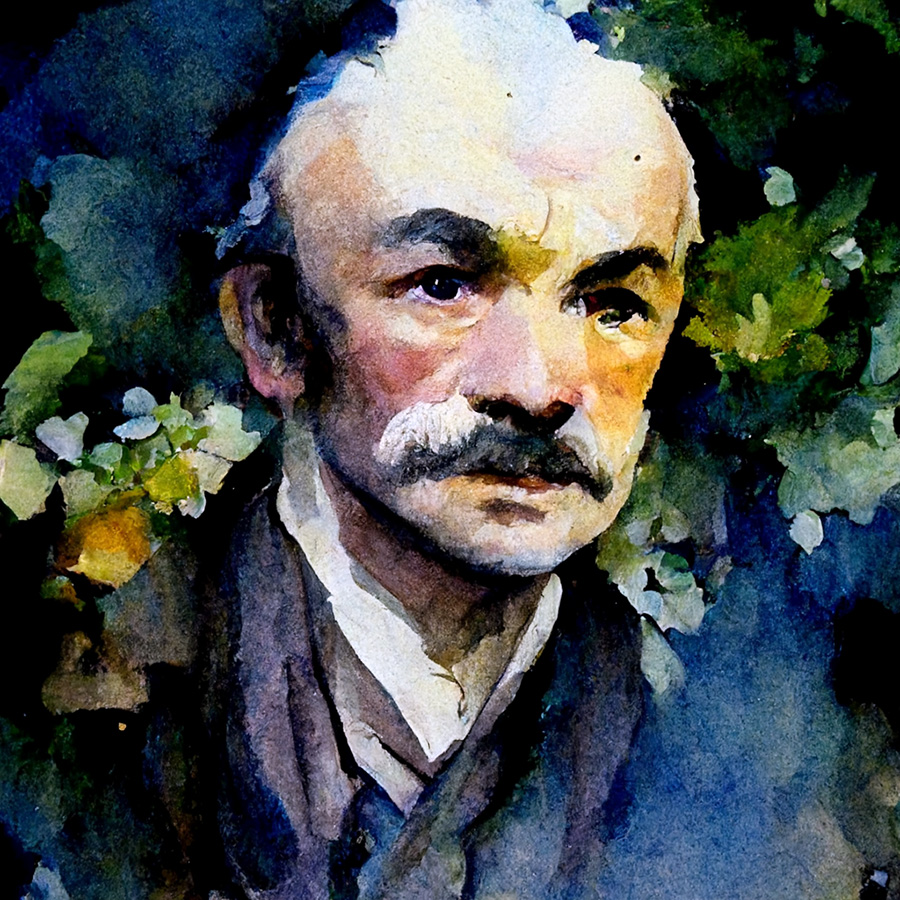
Thomas Hardy (1840-1928) is known as a novelist. Major works include “Far From the Madding Crowd” (1874); “The Return of the Native”(1878); “The Mayor of Casterbridge” (1886); “Tess of the d’Urbervilles” (1891); and “Jude, the Obscure “(1895). All five were shocking in their time for their pessimism and sexual themes and continue to tug at the hearts and trouble the confidence of readers. Two romances – “Under the Greenwood Tree” (1872) and “The Woodlanders” (1888) – are treasured by Hardy enthusiasts, and were by their author. All have been re-produced as films. It is surprising, then, to find that Hardy gave up writing novels in 1896 and spent his last 32 years writing poetry, his first love all along.
#
Hardy had been working earnestly at his poetry since the early 1860s, and his first published collection, “Wessex Poems” (1898) included earlier works, as did several succeeding collections. Writing about his life, Hardy claimed poetry his special love all along, a love unfortunately that could not pay the bills. In middle life, he was famous and financially secure and could turn his efforts to poetry. Hardy had begun as an architect’s assistant, with a special devotion to gothic style and repairing churches. He was a craftsman, applying a draughtsman’s fine eye and hand. In his early career as a poet, Hardy applied a craftsman’s tenacity, gathering lists of uncommon words and phrases and trying experiments in metrics and verse forms, in a workman-like manner far removed from Romantic inspiration. As an aspiring poet, Hardy kept his wits about him and avoided the ecstasy of Shelley, the comforts of Wordsworth, and the smooth musicality of Tennyson to find a voice suited to his regional origins and the growing unease troubling high Victorian belief. He was a child of Darwin, of the hard-stone realism of his craft, and rejected the consolations of conventional religion.
Hardy published 900 poems in more than 600 verse forms, mostly of his own devising. In his poems one hears the regional accents of rural Dorset and the ever-present musical culture of his upbringing. Hardy’s father was a local church musician – as memorialized in Under the Greenwood Tree – and Hardy himself a fervent violinist and an enthusiast of country dancing, well into his eighties. He loved Gothic spontaneity, the sly and shocking little gremlins peering out from the decent behavior of the poetic line. Sometimes the line will not scan, no matter how much force one applies, and sometimes the poem’s progress within its form breaks down. Early on, critics attributed this irregularity to Hardy’s incompetence; now it is clear it was a key feature of his art.
The range of Hardy’s poems has defeated anthologists, who have struggled to identify those handful of poems to represent his art. Hardy wrote comic poems like “The Ruined Maid”, and a fistful of sharp- edged anti-war poems like “The Souls of the Slain”, boisterous pieces like “Great Things”, celebrations of good times like “Reminiscences of a Dancing Man”, poems of torment “Wessex Heights”, dramatic scenes “In the Servants’ Quarters”, country ballads “A Set of Country Songs”, sheaves of pained elegies occasioned by his wife’s passing, and poems searching for spiritual foundations in a fractured and God- tormented world. A short essay can doing little more than touch on this variety, look closely at a few poems, and interest readers in visiting with Hardy in collections, on audible performance, and in the splendid online compilation available from the Hardy Society. [1]
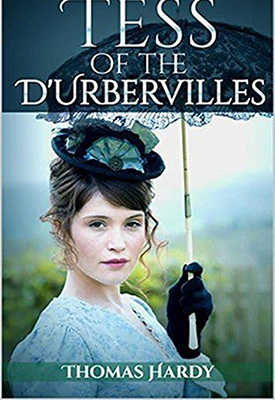
[Hardy’s fame rests on his novels – 1872-1896 – several of which have become popular films and television series. In its time Tess shocked readers with its sexuality and irreverence; a century later it had settled in as a staple in high school English courses.]
Dancing and Carousing Poems
Great Things
Sweet cyder is a great thing, A great thing to me,
Spinning down to Weymouth town By Ridgway thirstily,
And maid and mistress summoning Who tend the hostelry:
O cyder is a great thing, A great thing to me!
The dance it is a great thing, A great thing to me,
With candles lit and partners fit
For night-long revelry;
And going home when day-dawning Peeps pale upon the lea:
O dancing is a great thing, A great thing to me!
Love is, yea, a great thing, A great thing to me,
When, having drawn across the lawn
In darkness silently,
A figure flits like one a-wing
Out from the nearest tree:
O love is, yes, a great thing, A great thing to me!
Will these be always great things,
Great things to me? . . .
Let it befall that One will call,
‘Soul, I have need of thee:’
What then? Joy-jaunts, impassioned flings,
Love, and its ecstasy,
Will always have been great things,
Great things to me!
“Great Things” is in Hardy’s carousing mood. In one of his favorite impersonations, he becomes a countryman with a rambunctious spirit for fun and son-of-the soil mockery. The poem begs to be read aloud in its bouncing 4/3 pattern, with trochees rattling against anapests, interspersed with well- behaved iambic lines. In the same spirit of light misbehavior, the speaker mixes raw but simple pleasures with the pretention of spiritual grandeur. Drink and dance are spiced with sexual delights,with “maids and mistresses” beckoning, and revelry lasting into morning and a frisky notion of love “in darkness silently/ a figure flits” to hide the dalliance. Love, here, is not to be mistaken for a mere sentiment or an earnest pledge of honorable companionship lasting more than an evening. In the final stanza, the speaker rejects any need for settling the moral score or need for repentance. At the end of his days, won’t he feel the need for absolution? Not for a moment. When God – here defiantly named “that One” summons him (a supposed organ-toned summoning -- unlike that of maids and mistresses) to clear accounts for his “Joy-joints, impassioned flings,/ Love, and its ecstasy”, he’ll be able to look back, with jolly liberality, granting himself full authority and pleased that he pleased himself with “Great things to me!” It’s a poem requiring a tankard and jolly company.
Channel Firing
[Hardy poetry is full of surprises, like the gothic adornments of the style he favored. Sometimes the strange figure emerges in the poem’s notions, but often in the poetic line, when orderly scansion breaks down, he violates the dictates of the form, or introduces ghostly and imaginary persons.]
That night your great guns, unawares,
Shook all our coffins as we lay,
And broke the chancel window-squares,
We thought it was the Judgment-day
And sat upright. While drearisome
Arose the howl of wakened hounds:
The mouse let fall the altar-crumb,
The worms drew back into the mounds,
The glebe cow drooled. Till God called, ‘No;
It’s gunnery practice out at sea
Just as before you went below;
The world is as it used to be:
‘All nations striving strong to make
Red war yet redder. Mad as hatters
They do no more for Christés sake
Than you who are helpless in such matters.
‘That this is not the judgment-hour
For some of them’s a blessed thing,
For if it were they’d have to scour
Hell’s floor for so much threatening. . . .
‘Ha, ha. It will be warmer when
I blow the trumpet (if indeed
I ever do; for you are men,
And rest eternal sorely need).’
So down we lay again. ‘I wonder,
Will the world ever saner be,’
Said one, ‘than when He sent us under
In our indifferent century!’
And many a skeleton shook his head.
‘Instead of preaching forty year,’
My neighbour Parson Thirdly said,
‘I wish I had stuck to pipes and beer.’
Again the guns disturbed the hour,
Roaring their readiness to avenge,
As far inland as Stourton Tower,
And Camelot, and starlit Stonehenge.
April 1914
“Channel Firing” is one of Hardy’s anthologized poems. He’s having his garrulous way with a serious topic, the futility and mindless repetition of war. War was a continuing topic for Hardy, from the chilling “Drummer Hodge” on the wasted sacrifice in England’s Boer War, to the funereal “Souls of the Slain”, the mockery of “Men Who March Away (Song of the Soldiers)”, “In Time of ‘The Breaking of Nations’”, and the brief and wicked WWI epitaph “Christmas 1924”. There is also Hardy’s Magnum Opus, the vast and unreadable “The Dynasts”, a closet-drama treating the Napoleonic Wars, only a scholar could tolerate. “Channel Firing” is bone-rattling good fun, starring God and a small cast of restless skeletons.
The speaker is a long since moldering corpse resting in a country churchyard on England’s southern coast. The boney spirit is startled awake by gunnery practice at sea along with howling hounds, a startled mouse, quietly gnawing worms, and a slow-chewing bovine (“the glebe cow drooled”). A chatty and familiar God comes on the scene to settle the nerves of the startled bone-hoard, explaining the thunder as mere war preparation, same as it ever was; just the nations working at perfecting war’s machinery and mad as hatters. God is hardly shocked and makes a joke of it. If this were indeed the Judgment Day those breaking the peace would be condemned to polishing Hell’s flagstones. God then, playfully imagines the end times when humanity will suffer Hell’s brimstone eternally, only to change his mind, mercifully to allow the dead to rest since being human is a tedious ordeal.
As the speaker settles in again to his coffin, we hear the comments of his neighbors. One ponders whether humankind will ever grasp war’s futility; another, a country pastor who spent his days improving human nature, recognizes the futility of it; better to have spent his time on “pipes and beer” in the tavern with his fellows. The guns continue their oratorio of vengeance, a performance as old as 9th Century King Alfred (Stourton Towers), King Arthur of Camelot, and the pre-historic cutters and masons of Stonehenge. God ponders this in comic frustration, throwing up his hands in mock despair, and shattering metrics of the final line.
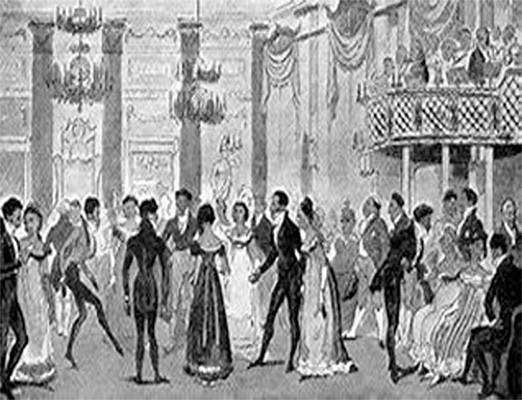
[The Regency period was known for London high life, here depicted in Willis’ dance floor, which, along with Almack’s, was famous for its gatherings of high-stepping fashionable folks.]
Reminiscences of a Dancing Man
I
Who now remembers Almack’s balls –
Willis’s sometime named –
In those two smooth-floored upper halls
For faded ones so famed?
Where as we trod to trilling sound
The fancied phantoms stood around,
Or joined us in the maze,
Of the powdered Dears from Georgian years,
Whose dust lay in sightless sealed-up biers,
The fairest of former days.
II
Who now remembers gay Cremorne,
And all its jaunty jills,
And those wild whirling figures born
Of Jullien’s grand quadrilles?
With hats on head and morning coats
There footed to his prancing notes
Our partner-girls and we;
And the gas-jets winked, and the lustres clinked,
And the platform throbbed as with arms enlinked
We moved to the minstrelsy.
III
Who now recalls those crowded rooms
Of old yclept ‘The Argyle’,
Where to the deep Drum-polka’s booms
We hopped in standard style?
Whither have danced those damsels now!
Is Death the partner who doth moue
Their wormy chaps and bare?
Do their spectres spin like sparks within
The smoky halls of the Prince of Sin
To a thunderous Jullien air?
If there is an onomatopoeia of rhythm as there is of sound, this poem proves it – a poem about dancing should dance. It is also evidence of Hardy’s superb range and facility with language, a tour de force of his rare skill. The stanza form supports a wonderful range of dancing motion -- with beats as follows: 4/3/4/3/4/4/3/4/4/3 and an inventive rhyme scheme of a/b/a/b/c/c/ d/e/e/d, with the e/e lines built on a/a/b/a half line rhymes (“spin”/ “within”/”halls”/”Sin”). I read the opening line of each stanza – each a question – with emphasis on the first words – “WHO now remembers …” and “WHO now recalls …” (rather than iambic), which set the music of the stanza dancing. The last line opens with anapest footwork to bring the dance to a close.
As in so many Hardy poems, “Reminiscences” gathers glamor from the past, in this case the Regency past of London high-life, and not the regional world of Dorset. The poem recalls a famed dancing club, Almack’s, and the “powdered Dears of Georgian years”, and in the next stanza Cremorne, a fashionable garden venue that hosted spirited dancing, set to hit tunes of the day, as Jullien’s quadrilles. The last stanza stitches in curious words “yclept”, “hopped”, “moue”, “chaps” and the happy and unexpected “Prince of Sin”, Hardy’s thumbing the nose to Victorian reserve and moral squeamishness.
Hard Thoughts and Tortured Metrics
The Last Chrysanthemum
Why should this flower delay so long
To show its tremulous plumes?
Now is the time of plaintive robin-song,
When flowers are in their tombs.
Through the slow summer, when the sun
Called to each frond and whorl
That all he could for flowers was being done,
Why did it not uncurl?
It must have felt that fervid call
Although it took no heed,
Waking but now, when leaves like corpses fall,
And saps all retrocede.
Too late its beauty, lonely thing,
The season’s shine is spent,
Nothing remains for it but shivering
In tempests turbulent.
Had it a reason for delay,
Dreaming in witlessness
That for a bloom so delicately gay
Winter would stay its stress?
– I talk as if the thing were born
With sense to work its mind;
Yet it is but one mask of many worn
By the Great Face behind.
“The Last Chrysanthemum” is deceptive. It seems at first a Tennysonian “Flower in the Crannied Wall” poem, reassuring us of the happy coalescence of God/Nature/human soul, as a “bloom so delicately gay” should do. Yet, something is off here. The scansion if off kilter, surprising in a short-line poem with predictable a/b/a/b rhymes, as if stray and unseemly thoughts keep trying to break in. Lines 1 and 2 follow the “Child’s Garden of Verses” 4/3 formula, but lines 3 are pentameter, often launched with an initial trochee (DAT-duh) inviting an anapest (duh- duh-DAT) overtone.
Worse yet, the delicate bloom is beset with troubles. Flowers in early spring lie in their tombs, the sun must apologize for not rousing them adequately, and now leaves fall like corpses, sap recedes from the oncoming cold, late fall’s turbulent tempests and winters stress (a botanical term), against which, in witlessness, the poor bloom delays its flowering. Where did all this hard actuality come from? Clearly from outside the calm and nourishing world of poetry. What should be a reassurance of Nature’s and God’s protectiveness becomes a topic of anxiety and doubt.
The poet, aroused from his stupor, is shocked to find he has been lured by poetry into ignorance and false hope. He rejects the anthropomorphizing that would ascribe purpose and intelligence to the flower – a piece of silliness – and understands instead that the Chrysanthemum’s helplessness against its existential challenges are his own. Like the flower, he confronts the inscrutable face behind it all, the blank wall of tomb, death, obliteration for no reason or purpose either he or the fragile bloom can fathom. The flower ends up staring him in the face with anxieties he cannot begin to settle. The poem charts a dismal path of discovery and invites the reader to follow.
Shelley’s Skylark
(The Neighbourhood of Leghorn: March 1887)
Somewhere afield here something lies
In Earth’s oblivious eyeless trust
That moved a poet to prophecies –
A pinch of unseen, unguarded dust:
The dust of the lark that Shelley heard,
And made immortal through times to be; –
Though it only lived like another bird,
And knew not its immortality:
Lived its meek life; then, one day, fell –
A little ball of feather and bone;
And how it perished, when piped farewell,
And where it wastes, are alike unknown.
Maybe it rests in the loam I view,
Maybe it throbs in a myrtle’s green,
Maybe it sleeps in the coming hue
Of a grape on the slopes of yon inland scene.
Go find it, faeries, go and find
That tiny pinch of priceless dust,
And bring a casket silver-lined,
And framed of gold that gems encrust;
And we will lay it safe therein,
And consecrate it to endless time;
For it inspired a bard to win
Ecstatic heights in thought and rhyme.
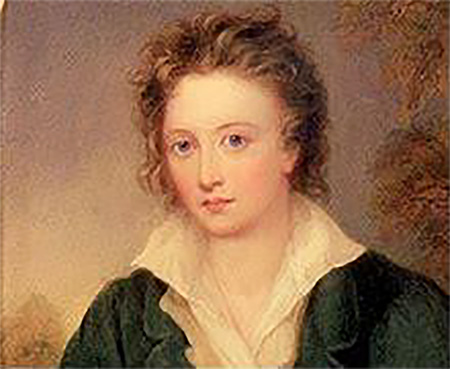
[Percy Bysshe Shelley (1792-1822) became the ultimate figure of Romantic sensibility and transcendental aspirations. Hardy struggles to escape the allure of the “viewless wings of poesy”.]
“Shelley’s Skylark” continues Hardy’s assault on the poetic tradition he (and we) are supposed to inherit. Shelley had written: “Bird thou never wert, /That from Heaven, or near it, /Pourest thy full heart In profuse strains of unpremeditated art. /Higher still and higher /From the earth thou springest /Like a cloud of fire; /The blue deep thou wingest, /And singing still dost soar, and soaring ever singest. /In the golden lightning
/Of the sunken sun /O'er which clouds are bright.” Hardy mocks this spiritual uplift reducing it to material reality, the bird no more than “a little ball of feather and bone” that knew nothing of immortality. Against all urgings to poesy, Hardy proposes at best a list of feeble “maybes”.
The conclusion of this meditation heads in conflicting directions. Is the speaker’s invocation of faeries mockery, or has the poet surrendered to the force of poetry and re-entered Shelley’s blessed enthusiasms? Has his sojourn to the sacred haunts of bards and pure imaginings, inspired him, if only for this precious moment? The poem wavers between rough dismissal and consecration, between “ecstatic heights in thought and rhyme” to willed fantasy, requiring faeries and the clap-trap of the silver and gem encrusted casket. But, then again ….
The Blinded Bird
So zestfully canst thou sing?
And all this indignity,
With God’s consent, on thee!
Blinded ere yet a-wing
By the red-hot needle thou,
I stand and wonder how
So zestfully thou canst sing!
Resenting not such wrong,
Thy grievous pain forgot,
Eternal dark thy lot,
Groping thy whole life long
, After that stab of fire;
Enjailed in pitiless wire;
Resenting not such wrong!
Who hath charity? This bird.
Who suffereth long and is kind,
Is not provoked, though blind
And alive ensepulchred?
Who hopeth, endureth all things?
Who thinketh no evil, but sings?
Who is divine? This bird.
“The Blind Bird” pursues another analogy to investigate the nature of poetry and the poet. This is not a blind bird, but one that has been blinded by its master in order to secure its services against the risk of escape. The rhetoric is biblical: “canst” “hath” “suffereth” and excerpts from St. Paul’s “Hymn to Love” (1 Corinthians 13). As usual with Hardy, the tale defaces religion. God has blinded and caged us, where only the noblest, in helpless ignorance, can transcend our subjugation, “ensepulchred” and “enjailed” in eternal dark for all our lives. God has done this to us and for reasons we cannot imagine. The speaker accuses God and champions instead the spirit that can sing despite this injustice and humiliation, ennobling patience and kindness as the soul of love, despite God’s cruelty. This Gothic chapel of a poem is fit epitaph for Jude, the Obscure, Hardy’s bitterest novel.
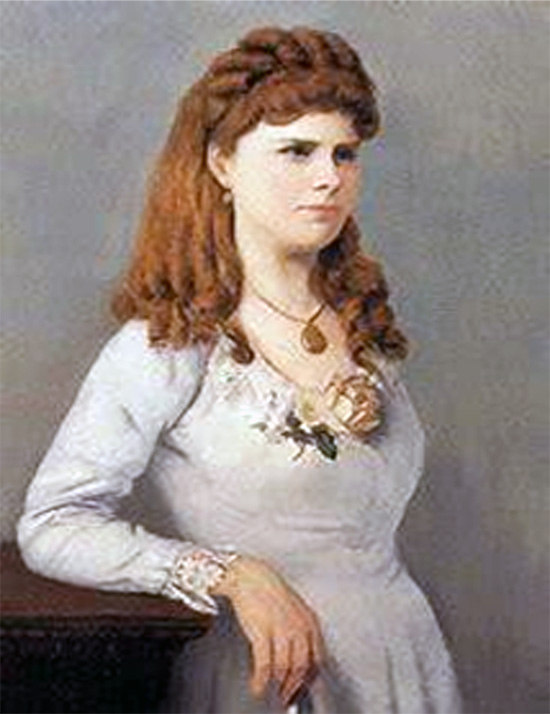
[Hardy met and married Emma Gifford in 1868. She was a sturdy young woman and defied her family in accepting an earnest and hard-working young architect-mason who lacked family credentials and had no obvious advantages in wealth or career. They had no children and grew apart over the years.]
The Elegies
Hardy’s wife died in 1913. Having gotten to know Hardy, even this little bit, we can expect his elegies to be cross-hatched with counter-feelings, formal rough spots (gothic gremlins), and violations of genre proprieties. In 1868, and after a series of romantic disappointments, Hardy had met and married Emma Gifford, sister-in-law of the rector of a church he was restoring. As often the case for Hardy, her family looked down upon his people and his prospects, but Emma supported his aspirations. She was vigorous and attractive, an avid horsewoman. Over the years, they grew apart, differing especially on religion. Emma was conventionally Christian, while Hardy was increasingly unguarded about his atheism, often a sour topic in his novels. They had no children, and soon after her death, Hardy married his assistant, thirty-seven years his junior. Hardy remained loyal to his wife’s memory and was interred by her side (his heart buried in Poet’s Corner in Westminster Abbey). Much of Hardy’s finest poetry consists of his troubled elegies, stretched across phantom hauntings and fears of unsteady devotion.
Hardy’s “Poems of 1912-13” contains many notable elegies, full of pain and regret. One longer piece, “The Going” concludes: “I seem but a dead man held on end/To sink down soon O you could not know/That such swift fleeing/No soul foreseeing –/Not even I – would undo me so!” In “The Voice”, the grieving poet hears her voice “as at first, when our day was fair”; and then: “yes, as I knew you then,/Even to the original air-blue gown!” In the final stanza, Hardy breaks form, modeling the speaker’s grief, as if composing the poem falls away in the need to relieve his grief and longing. Among the many elegiac pieces, I have chosen three to represent Hardy’s complexity and passion.
In Tenebris I
‘Percussus sum sicut fœnum, et aruit cor meum.’ – PS. CI
Wintertime nighs;
But my bereavement-pain
It cannot bring again:
Twice no one dies.
Flower-petals flee;
But, since it once hath been,
No more that severing scene
Can harrow me.
Birds faint in dread:
I shall not lose old strength
In the lone frost’s black length:
Strength long since fled!
Leaves freeze to dun;
But friends can not turn cold
This season as of old
For him with none.
Tempests may scath;
But love can not make smart
Again this year his heart
Who no heart hath.
Black is night’s cope;
But death will not appal
One who, past doubtings all,
Waits in unhope.
“In Tenebris” (in darkness) referencing Psalm 102: 4 – “My heart is stricken and withered like grass
…” finds its voice in a stern short line form and tortured syntax. The lines are cut in stone, spare and angular, with odd and antique vocabulary – “nighs”/ “scath”/”appal”/”dun”/”cope”/”harrow” – and twisted phrases – “But my bereavement-pain/It cannot bring again” and “love can not make smart/Again this year his heart/Who no heart hath”. The voice is constricted and laconic, rendering suffering grasping for words, crossed by quick images, rushed to expression, as in “Twice no one dies./Flower-petals flee;”. The wintry scene yields wintry thoughts: “friends can not turn cold/This season as of old/For him with none…” momentarily hopeful, and then blank. Grim humor abounds – ”death will not appal/One who, past doubtings all,/Waits in unhope.” Sunk in gloom, the speaker is beyond despair in a realm of “unhope”, where hope casts its mocking shadow.
Hardy, an ardent anti-theist, knew and adored the bible and its poetry and rhetorical power. “Birds fain in dread” is borrowed from the Psalm as are the friends turned cold. Unlike the Psalm, however, the speaker cannot imagine deliverance from pain enacted by a God who is mighty and eternal. The shadow of a King who endures, while all else falls to tatters like old garments, a strength to offspring forever, casts its pall over this bereaved and abandoned lover.
The Phantom Horsewoman
I
Queer are the ways of a man I know:
He comes and stands
In a careworn craze,
And looks at the sands
And the seaward haze
With moveless hands
And face and gaze, Then turns to go . . .
And what does he see when he gazes so?
II
They say he sees as an instant thing
More clear than to-day,
A sweet soft scene
That was once in play
By that briny green;
Yes, notes alway
Warm, real, and keen,
What his back years bring –
A phantom of his own figuring.
III
Of this vision of his they might say more:
Not only there
Does he see this sight, But everywhere
In his brain – day, night,
As if on the air
It were drawn rose bright –
Yea, far from that shore
Does he carry this vision of heretofore:
IV
A ghost-girl-rider. And though, toil-tried,
He withers daily,
Time touches her not,
But she still rides gaily
In his rapt thought
On that shagged and shaly
Atlantic spot,
And as when first eyed
Draws rein and sings to the swing of the tide. 1913
“The Phantom Horsewoman” -- rhythmic, exuberant and free-swinging -- is an elegy in quite a different key, recalling youth and beauty and athleticism, possessed eternally in images that do not fade.
Although the poem does what it can to distance the speaker – “a man I know” -- from Hardy himself, Emma Gifford was an accomplished rider when she and Hardy met and the “Shagged and shaly/ Atlantic spot” fits the hard-pebbled beaches of Dorset. The play of memory and the present scene is a common trope in Hardy’s poetry, even the eerie notion of a ghostly presence in the scene long ago, aware the frozen moment would remain more real than anything that might follow. The sense of loss is both enhanced and diminished in the theater of memory.
The poem adheres to an unusual verse form and a tug of war between iambic marching
and anapestic swinging rhythms, leading to the last line – “sings to the swing of the tide”. The
poem includes the man in “careworn craze” at its center, but also an intelligence that looks on, with intense questions – ”what does he see” -- and a larger group “they” who also witness him puzzled and somewhat alarmed. The questioner observes that this phantom vision attends the grieving lover always and everywhere and not only at the site of its first fashioning. The “ghost girl-rider” remains always as she was when this vision was struck, though he “withers daily” caught in time’s decay. The poem itself redeems him, making real the phantom and that moment. Memory recovers that moment when she “Draws rein and sings to the swing of the sea.” A companion poem, “The Haunter”, reverses roles -- He does not think that I haunt here nightly:/”How shall I let him know” -- and imagines the pleasant thoughts of the phantom reaching across to the man who loved her.
At Castle Boterel
As I drive to the junction of lane and highway,
And the drizzle bedrenches the waggonette,
I look behind at the fading byway,
And see on its slope, now glistening wet,
Distinctly yet
Myself and a girlish form benighted
In dry March weather. We climb the road
Beside a chaise. We had just alighted
To ease the sturdy pony’s load
When he sighed and slowed.
What we did as we climbed, and what we talked of
Matters not much, nor to what it led, –
Something that life will not be balked of
Without rude reason till hope is dead,
And feeling fled.
It filled but a minute. But was there ever
A time of such quality, since or before,
In that hill’s story? To one mind never,
Though it has been climbed, foot-swift, foot-sore,
By thousands more.
Primaeval rocks form the road’s steep border,
And much have they faced there, first and last,
Of the transitory in Earth’s long order;
But what they record in colour and cast
Is – that we two passed.
And to me, though Time’s unflinching rigour,
In mindless rote, has ruled from sight
The substance now, one phantom figure
Remains on the slope, as when that night
Saw us alight.
I look and see it there, shrinking, shrinking,
I look back at it amid the rain
For the very last time; for my sand is sinking,
And I shall traverse old love’s domain
Never again.
March 1913
“At the Castle Boterel” covers the same ground but in a different tone. While much is fading in the drizzle, the grieving speaker recalls that one precious moment, distilled to redeem a lifetime. The scene is played against a primeval background, “transitory in Earth’s long order”. This is Darwin’s scale of time and change, where multitudes of young lovers have passed that same way and experienced the rush of love and desire -- “what life will not be balked of ”. Still against that vast canvass, what the grieving speaker and his lost girl experienced may persist. And yet, in the rain, the memory shrinks, and with awful and short-line finality, love can be revived “never again”. The poem includes the interplay of time’s vast backdrop and the specific time and place and feelings of two lovers whose elation promises to sweep over time and earth’s geological dimension. In the end, time’s cycle winds downward, and joy endures less than primeval rock.
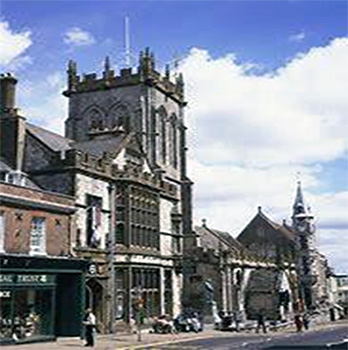
Dorchester’s High Street, the original for Hardy’s town that rejected an imagined version of himself, in Jude, the Obscure and in the tormented poem, “Wessex Heights”.
Wessex Heights
(1896)
There are some heights in Wessex, shaped as if by a kindly hand
For thinking, dreaming, dying on, and at crises when I stand,
Say, on Ingpen Beacon eastward, or on Wylls-Neck westwardly,
I seem where I was before my birth, and after death may be.
In the lowlands I have no comrade, not even the lone man’s friend –
Her who suffereth long and is kind; accepts what he is too weak to mend:
Down there they are dubious and askance; there nobody thinks as I,
But mind-chains do not clank where one’s next neighbour is the sky.
In the towns I am tracked by phantoms having weird detective ways –
Shadows of beings who fellowed with myself of earlier days:
They hang about at places, and they say harsh heavy things –
Men with a wintry sneer, and women with tart disparagings.
Down there I seem to be false to myself, my simple self that was,
And is not now, and I see him watching, wondering what crass cause
Can have merged him into such a strange continuator as this,
Who yet has something in common with himself, my chrysalis.
I cannot go to the great grey Plain; there’s a figure against the moon,
Nobody sees it but I, and it makes my breast beat out of tune;
I cannot go to the tall-spired town, being barred by the forms now passed
For everybody but me, in whose long vision they stand there fast.
There’s a ghost at Yell’ham Bottom chiding loud at the fall of the night,
There’s a ghost in Froom-side Vale, thin-lipped and vague, in a shroud of white,
There is one in the railway train whenever I do not want it near,
I see its profile against the pane, saying what I would not hear.
As for one rare fair woman, I am now but a thought of hers,
I enter her mind and another thought succeeds me that she prefers;
Yet my love for her in its fulness she herself even did not know;
Well, time cures hearts of tenderness, and now I can let her go.
So I am found on Ingpen Beacon, or on Wylls-Neck to the west,
Or else on homely Bulbarrow, or little Pilsdon Crest,
Where men have never cared to haunt, nor women have walked with me,
And ghosts then keep their distance; and I know some liberty.
“Wessex Heights” was published just when Hardy abandoned novels to return to poetry. Wessex is, of course, Hardy’s fictional world, an imaginative after-image of Dorset where his life was spent. The poem is slow and somber, with none of the musicality and spiritedness and little of local reference and narrative support. We do not know from evidence in the poem what has caused this grim outlook in the speaker, only that the speaker’s estrangement is raw, phantasmal, and near total. Wessex may be home, but its comforts are uncertain, perhaps deluding, and intentionally hostile. What may seem shaped by a kindly hand, may not be so, and the invitation to imagine a spiritual home, from before and after life, a false promise. There is a paranoid quality to the speaker’s fears and uncertainties. God, the “lone man’s friend”, is unavailable, as is the goddess of Christian charity, who “suffereth long and is kind.” “Down there” in the cities of the grey plains, modern equivalents of Sodom and Gomorrah, there is no fellowship. Instead, people are untrusting and devious, enslaved to dull and conventional thinking, unfriendly, even incoherent to the speaker.
The fellowship of earlier days is replaced with surveillance, common chatter reduced to harsh remarks and women’s “disparagings”. The speaker has turned against his best self, no longer able to resist the town’s bitterness. His youthful self, innocent and trusting, is stunned by what he has become, the “continuator” he now is. A malevolent spirit governs this world, “a figure against the moon” only the speaker sees. The traditions of the “tall-spired” town, (“Christminster” of Jude, the Obscure) rooted in the past and suffocating the present, reject him. A face in the window of a passing train, reminds him he is a stranger and haunts him.
The one respite has been the love of a “rare fair woman”, but she turns away from him as from a bad thought. He would persist in his love for her, but tenderness is unproductive, and so he would prefer to be done with it, but obviously cannot. Time does not “cure hearts of tenderness”, much as he would wish it so. Only in the lonely heights above the treacherous towns can he expect relief, where the “only neighbor is the sky”, a mute replacement for the “lone man’s friend.”
Hardy’s poem expresses Emile Durkheim’s “anomie”, a term from his work on suicide in 1897 to describe the modern disease. However, Hardy’s poem has its antecedents in Psalms and in religious traditions. ”Wessex Heights” resembles Matthew Arnold’s “Dover Beach”, but its blank expression does not come wrapped in Arnold’s classical eloquence. “Wessex Heights” belongs to 20th century anxieties.
It seems a pity to come to this sad end, so I offer instead a sweeter last note:
Weathers
I
This is the weather the cuckoo likes,
And so do I;
When showers betumble the chestnut spikes,
And nestlings fly:
And the little brown nightingale bills his best,
And they sit outside at “The Travellers’ Rest”,
A nd maids come forth sprig-muslin drest,
And citizens dream of the south and west, And so do I.
II
This is the weather the shepherd shuns,
And so do I;
When beeches drip in browns and duns,
And thresh, and ply;
And hill-hid tides throb, throe on throe,
And meadow rivulets overflow,
And drops of gate-bars hang in a row,
And rooks in families homeward go,
And so do I.
Suggestions:
- Richard Burton recorded his excellent reading of two dozen of Hardy’s poems (available from Audible at Amazon). Burton finds the regional dialect voices in Hardy’s various moods, themes, and verse forms. It was this performance that first interested me in Hardy’s poetry.
- The Hardy Society (accessible online) has catalogued all 900 poems and made them available for downloading and printing.
- Neil Wenborn. Reading Thomas Hardy: Selected Poems. Humanities E-Books LLP, 2012. Available also as Amazon Kindle. This provides a first-rate account Hardy’s career as a poet and readings that are especially alert to the music in his poetry.